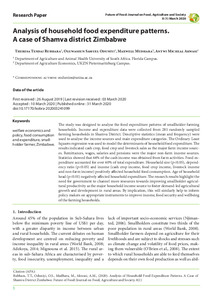| dc.date.accessioned | 2020-04-29T07:46:45Z | |
| dc.date.available | 2020-04-29T07:46:45Z | |
| dc.date.issued | 2020-03-31 | |
| dc.identifier | doi:10.17170/kobra-202003241099 | |
| dc.identifier.uri | http://hdl.handle.net/123456789/11530 | |
| dc.language.iso | eng | eng |
| dc.publisher | Section Specialized Partnerships in Sustainable Food Systems and Food Sovereignty at the University of Kassel, Germany and Federation of German Scientists (VDW) | |
| dc.rights | Urheberrechtlich geschützt | |
| dc.rights.uri | https://rightsstatements.org/page/InC/1.0/ | |
| dc.subject | welfare economics and policy | eng |
| dc.subject | food consumption and expenditure | eng |
| dc.subject | smallholder farmer | eng |
| dc.subject | Zimbabwe | eng |
| dc.subject.ddc | 630 | |
| dc.title | Analysis of household food expenditure patterns. A case of Shamva district Zimbabwe | eng |
| dc.type | Aufsatz | |
| dcterms.abstract | The study was designed to analyse the food expenditure patterns of smallholder farming households. Income and expenditure data were collected from 281 randomly sampled farming households in Shamva District. Descriptive statistics (mean and frequency) were used to analyse the income sources and main expenditure categories. The Ordinary Least Squares regression was used to model the determinants of household food expenditure. The results indicated cash crop, food crop and livestock sales as the major farm income sources. Remittances, wages, salaries and pensions were the major non-farm income sources. Statistics showed that 64% of the cash income was obtained from farm activities. Food expenditure accounted for over 60% of total expenditure. Household size (p<0.05), dependency ratio (p<0.05) and income (cash crop income, food crop income, livestock income and non-farm income) positively affected household food consumption. Age of household head (p<0.01) negatively affected household expenditure. The research results highlight the need for government to channel more resources towards improving smallholder agricultural productivity as the major household income source to foster demand-led agricultural growth and development in rural areas. By implication, this will similarly help to inform policy makers on appropriate instruments to improve income, food security and wellbeing of the farming households. | eng |
| dcterms.accessRights | open access | |
| dcterms.creator | Rubhara, Theresa Tendai | |
| dcterms.creator | Oduniyi, Oluwaseun Samuel | |
| dcterms.creator | Mudhara, Maxwell | |
| dcterms.creator | Akwasi, Antwi Michael | |
| dc.subject.swd | Lebensmittelverbrauch | ger |
| dc.subject.swd | Ausgaben | ger |
| dc.subject.swd | Wohlfahrtstheorie | ger |
| dc.subject.swd | Sozialpolitik | ger |
| dc.subject.swd | Kleinbauer | ger |
| dc.subject.swd | Zimbabwe | ger |
| dc.type.version | publishedVersion | |
| dcterms.source.identifier | ISSN 2197-411X | |
| dcterms.source.issue | No 1 | |
| dcterms.source.journal | Future of Food: Journal on Food, Agriculture & Society | eng |
| dcterms.source.volume | Volume 8 | |
| kup.iskup | false | |

